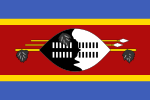
Back Culture de l'Eswatini French Cultura de Essuatíni Portuguese Культура Эсватини Russian Култура Есватинија Serbian Emasiko asEswatini Siswati
This article needs additional citations for verification. (May 2023) |
| Part of a series on the |
| Culture of Eswatini |
|---|
 |
| People |
| Languages |
| Cuisine |
| Religion |
| Music |
Swazi culture is the way of life and customs of the Swazi people through various historical stages. The culture of Swazi people involves music, food, religion, architecture, and kinship, among many other things.[1] The Swazi people are composed of various Nguni clans who speak the Nguni language siSwati. These people mostly reside in Eswatini and South Africa. Presently, Swazi people may also include citizens of Eswatini. In Eswatini, one of the most visible features of cultural identity is the traditional political structure of the nation and the home. In the national level, the Ngwenyama (the "Lion", or King) is considered the head of the nation alongside the Ndlovukati (the "She-Elephant", or Queen Mother) who is the spiritual leader of the nation. National cultural events often involve the Ngwenyama or Ndlovukati. At home, the patriarch of the family is the head and often practices polygamy. This headman, usually referred to as umnumzane is central to all activities of the home. A group of homes forming a community and the land they reside on forms a chiefdom or umphakatsi. Several chiefdoms form an inkhundla which then belongs of a regional division of the country. This connects the older traditional leadership structures to more modern forms of government.
There are national cultural events such as umhlanga, emaganu and incwala which take place at Royal residences of the Ngwenyama and Ndlovukati. Local cultural events in communities or imiphakatsi, take place at the residence of the chief also called emphakatsini. Weddings, funerals and religious events are usually carried out at family homesteads where neighbors are usually invited to partake.
- ^ SNTC. "CULTURAL RESOURCES: Swazi Culture". Swaziland National Trust Commission. Archived from the original on 24 February 2015. Retrieved 22 February 2015.